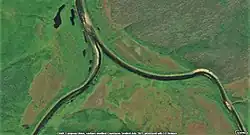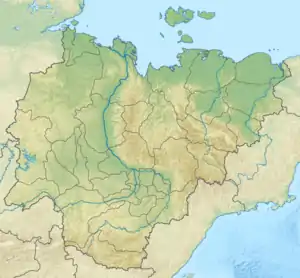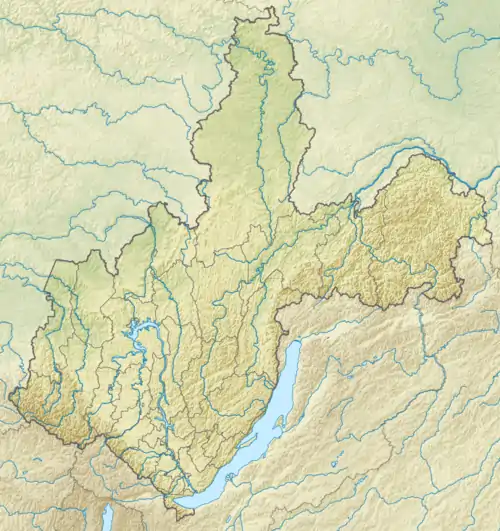Vakunayka
The Vakunayka (Russian: Вакунайка; Yakut: Вакунайка) is a river in the Sakha Republic (Yakutia) and Irkutsk Oblast, Russia. It is a right hand tributary of the Chona, and is 363 kilometres (226 mi) long, with a drainage basin of 10,100 square kilometres (3,900 sq mi).[1]
| Vakunayka Вакунайка | |
|---|---|
 Confluence of the Chona and the Vakunayka Sentinel-2 image | |
 Mouth location in Yakutia, Russia  Vakunayka (Irkutsk Oblast) | |
| Location | |
| Country | Katangsky District, Irkutsk Oblast Mirninsky District, Yakutia |
| Physical characteristics | |
| Source | |
| • location | Central Siberian Plateau |
| • coordinates | 60°40′08″N 110°05′04″E |
| Mouth | Chona |
• coordinates | 61°44′22″N 109°36′25″E |
| Length | 362 km (225 mi) |
| Basin size | 10,100 km2 (3,900 sq mi) |
| Basin features | |
| Progression | Chona → Vilyuy→ Lena→ Laptev Sea |
There are no permanent settlements by the Vakunayka. The Russian Geographical Society organized an expedition in 1853–55 to survey the orography, geology and population of the Vilyuy and Chona basins.[2]
Course
The river begins in the Central Siberian Plateau. It flows first westwards for a relatively short stretch, then it bends and heads roughly northwards across the middle part of the plateau, in the border area between Irkutsk Oblast and Yakutia. Parts of its floodplain are marshy. Finally the Vakunayka joins the right bank of the Chona 300 km (190 mi) from its mouth in the Vilyuy Reservoir. The river is fed by snow and rain and freezes between October and late May.[3]
The main tributaries of the Vakunayka are the 196 kilometres (122 mi) long Killemtine and the 80 kilometres (50 mi) long Mukoki on the right.[1][4][5]
See also
References
- "Река Вакунайка in the State Water Register of Russia". textual.ru (in Russian).
- Great Soviet Encyclopedia Richard Maack. Materials provided by the project Rubrikon.
- Вакунайка — Great Soviet Encyclopedia in 30 vols. / Ch. ed. A.M. Prokhorov - 3rd ed. - M, 1969-1978.
- "P-49-50 Topographic Chart (in Russian)". Retrieved 24 March 2023.
- Google Earth